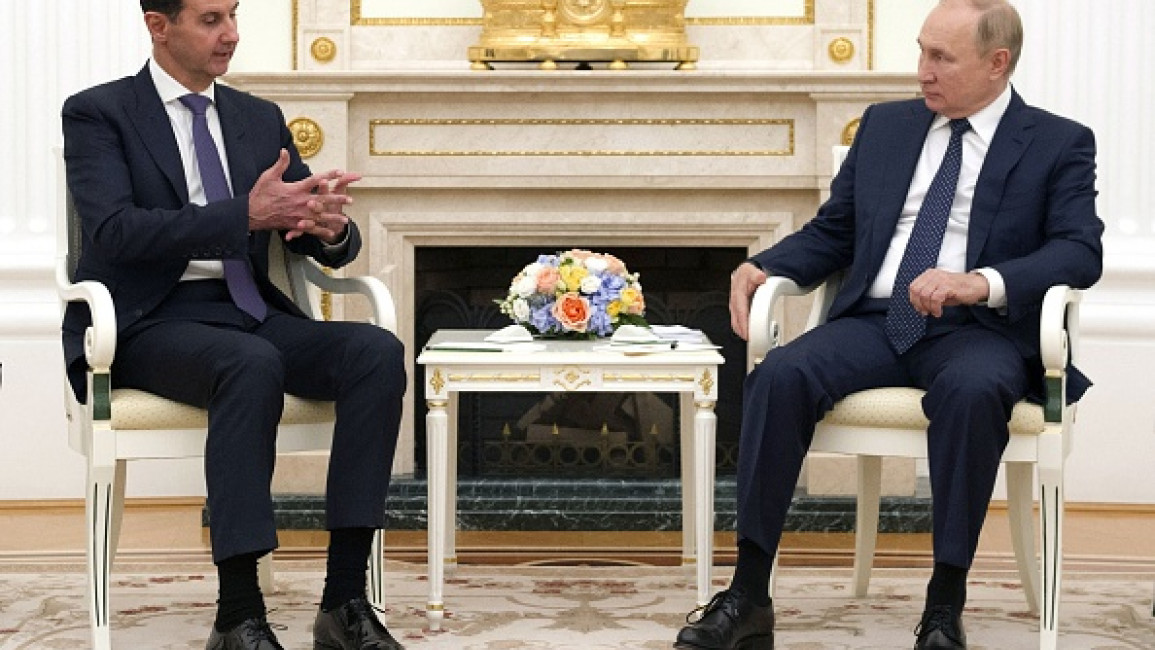Assad to visit Moscow in mid-March, likely to discuss normalisation
Syrian President Bashar al-Assad is to visit Moscow in mid-March, Russian officials revealed on Monday, where he is likely to discuss rapprochement with Turkey and normalisation with his Arab neighbours, experts said.
The spokesperson of the Kremlin said that al-Assad will visit Russia at a non-specified time, with other Russian outlets quoting diplomatic sources as saying the visit will come in mid-March.
The visit comes a little more than a month after the devastating 6 February earthquake which hit Syria and Turkey, leaving more than 53,000 dead and entire cities flattened.
Bashar al-Assad has received unprecedented international support since the earthquake, running contrary to his status as a pariah since his deadly crackdown on peaceful protests in 2011.
Some analysts have said that while negotiations between Ankara and Damascus will likely be on the agenda for Assad's visit to Moscow, the earthquake might have slowed the momentum for normalisation between the two countries.
"The visit of Assad regime to Moscow will likely include discussions of talks with Turkey … Without the Russian pressure, we can say that these talks would not have happened," Ömer Özkizilcik, an Ankara based analyst focusing on the Syrian crisis, told The New Arab.
Turkish President Recep Tayepp Erdogan expressed interest in a detente with Damascus as Turkey's presidential election approaches, with the Turkish FM signaling openness to meeting his Syrian counterpart.
The presence of more than three million Syrian refugees in the country has emerged as a key issue in the election, as a popular backlash against the presence of Syrians in Turkey flares.
Erdogan had previously floated a plan to return refugees to a so-called "safe zone" in northern Syria, despite human rights monitors warning that Syria is not yet safe for any sort of refugee return.
He has also escalated rhetoric against the presence of the US-backed Syrian Democratic Forces (SDF) on the southern Turkish border, which he views as an extension of the Kurdistan Workers' Party (PKK).
The PKK is listed as a terror group by Turkey, the US and EU. The group has fought with Turkey for Kurdish autonomy – a conflict which has left more than 40,000 dead since the 1980s.
However, the earthquake has likely changed domestic political considerations in Turkey, pushing relations with Syria lower on the list of priorities for Turkey.
"The top priority in Turkey now is the earthquake … The Turkish government does not have the same political motivation as it had before to talk with the Assad regime," Özkizilcik said.
The earthquake gave an "opportunity for the Assad regime to show itself to the world," a process Moscow is also involved in, Ruslan Trad, a security researcher at the Atlantic Council, told TNA.
"Damascus relies on the Kremlin’s international influence to restore its legitimacy, and it is already paying off," Trad explained.
Moscow has long pushed for normalisation with the Assad regime, reassuring neighbours such as Jordan that dialogue with the Assad regime could assuage some of its security concerns in Syria.
While some countries began to engage with the regime prior to the earthquake, efforts often stalled after intitial diplomatic contact.
However, several countries, such as Lebanon, Egypt and Jordan, have engaged more seriously with Assad post-earthquake, at least when it comes to humanitarian affairs.
Saudi Arabia, which has been staunchly opposed to Assad and has funded opposition to him in the past, has also said that the "status-quo" approach on Damascus in the region is not working.



